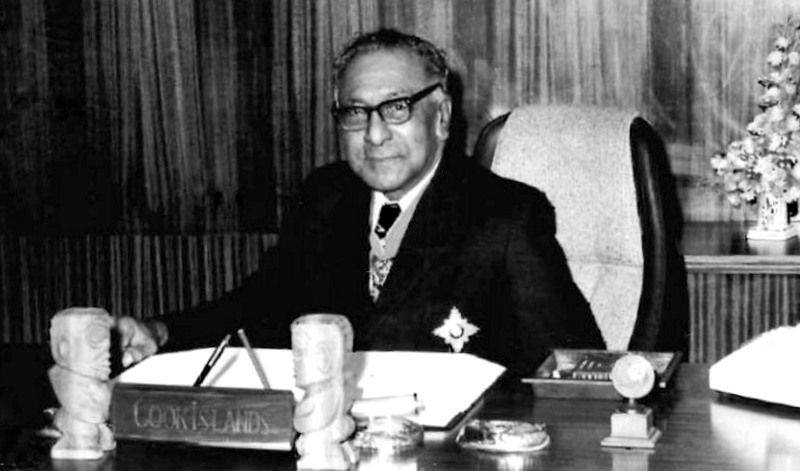Thomas Wynne: The last of the pooh-bahs
Saturday 18 November 2023 | Written by Thomas Tarurongo Wynne | Published in Editorials, Opinion

Cook Islands’ first premier Albert Royal Henry. 23111728
Who is Sir Gaven Donne, who upon his passing was referred to by the Sydney Morning Herald as ‘The Judge who toppled a government,’ the man who brought down our first political leader and father of our nation, writes Thomas Tarurongo Wynne.
Doone was pivotal in the overturning of an election in the Cook Islands which would see a government, not elected by the people, take the reins and thrust Tom Davis from deep within American Institutions like Harvard and NASA to the highest official and leader of the Cook Islands. A man and leader philosophically and politically in contrast to Albert Henry, be it his grasp of Cook Islands Māori, his oratory skills, his education, or his ability to reach the hearts and minds of the rikiriki, or Iti tangata of the Cook Islands – depending of course on who you talked to.
In an article from 2010, Sir Gaven Donne is remembered amongst international lawyers because of the impact of his judgment in the 1978 Cook Islands electoral petition. That case it said, had been variously described as “a landmark in British legal history” and “a triumph for the law vividly demonstrating the independence of the judiciary”.
Interesting when you put this statement against the ruling of the Court of appeal on Justice Donne’s excessive handling of Henry, with an appeal launched by his lawyer, the infamous Kevin Ryan in November 1979, which he won. For when Justice Donne took the unusual step of placing Henry on probation for three years for the purpose of restraining him from becoming a candidate for election to the Legislative Assembly, or for any other political office after his conviction, all three New Zealand judges overturned the political restraint placed on Henry by Justice Donne, saying “just as the courts should be free from political interference, so politics should be free from interference by the judiciary”.
So which one was it? Overt political interference by the judiciary which the Court of Appeal upheld, by preventing Henry to stand as a candidate for three years, or a landmark case of the independence of the judiciary said by his peers at his death. A three-year term that law and constitution would try and restrain Henry from standing as a candidate in 1965, that would yet again, try and restrain him in 1979. Whatever powers were driving the push to restrain Henry politically, their tenacity to pursue him and do all they could to prevent his entering politics is a statement of fact not fiction.
Despite this verdict from the Court of Appeal, Justice Donne, would ironically be knighted four months later, and then three years later assume the position of power yet again in the Cook Islands as our first Queen’s Representative. The Judiciary once again finding its way into our politics and this time in the highest Office apart from the Prime Minister.
Interesting also because though the Queen’s Representative is appointed by the Monarch, it is a political appointment and one often made by the sitting Prime Minister and Cabinet – and who was Prime Minister in 1982. None other than Tom Davis, whose political career was propelled into Office by the judgment of then Justice Donne.
One could speculate that Donne was handsomely rewarded in life, with the bringing down of a government and the subsequent removal of the father of our nation and a knighthood – a knighthood he would happily receive not long afterwards – and then be rewarded for his service as the highest constitutional figure and first of its kind in our new democracy.
Donne had a long legal career in the Pacific retiring from the bench in 2001, making him one of the longest serving judges in the Southern Hemisphere.
However, it is his critical role in our politics and the decisions he made in our courts that radically changed the course of our country, from nationalism to a free market, from a green and gold flag to blue. We should reexamine who this man was, the larger political and social forces and context driving his decisions, and how, if at all, he benefited from these changes.(Part three next week – The removal of a knighthood)














































